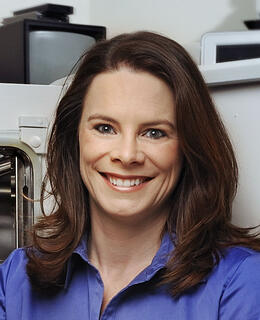
Kristina Diane Rinker
Positions
Professor
Schulich School of Engineering, Department of Biomedical Engineering
Member
Libin Cardiovascular Institute
Full Member
The Calvin, Phoebe and Joan Snyder Institute for Chronic Diseases
Child Health & Wellness Researcher
Alberta Children's Hospital Research Institute
Member
Arnie Charbonneau Cancer Institute
Contact information
Phone number
Office: 403.210.9733
Location
Office: CCIT122
For media enquiries, contact
Joe McFarland
Media Relations and Communications Specialist
Cell: +1.403.671.2710
Email: Joe.Mcfarland@ucalgary.ca
I'm looking for...
Background
Educational Background
Bachelor of Science Chemical Engineering, University of Alabama, 1992
Doctor of Philosophy Chemical Engineering, North Carolina State University, 1998
Research Assistant Professor Biomedical Engineering, Duke University, 2000
Biography
Dr. Rinker's research is highly collaborative locally and internationally focusing on molecular diagnostics and therapeutics in cancer and cardiovascular diseases, including transcriptional regulation, role of fluid forces, cell and nanoparticle behavior, and clinical studies. Dr. Rinker is actively involved in technology development and commercialization through university spin‐off companies and industrial and governmental partnerships in the areas of cardiovascular and cancer detection and treatment. Her previous academic appointments include being an Assistant Professor in the Department of Chemical and Biological Engineering at Colorado State University (2000‐2005) and an Assistant Research Professor in Biomedical Engineering at Duke University (1998‐2000).
Research
Areas of Research
- In vitro molecular diagnostics
- biomarkers
- transcriptomics
- drug targets
- medical devices
- mechanobiology
- Fluid force effects on transcriptional regulation and biomarker expression
Our research focuses on how blood flow affects cell and tissue behavior with relevance to cardiovascular health and disease, stem cells, and cancer. Cells are strongly affected by environmental conditions and adapt by changing their physiology to better suit new environments. One strong environmental factor is fluid flow. Fluid forces resulting from fluid flow can modulate events such as bacterial infection, mammalian cell viability in culture, cancer metastasis, stem cell differentiation, and susceptibility to disease in blood vessels. Understanding the components and mechanisms for cellular response to fluid forces may therefore help us better inhibit infections, more effectively produce bioproducts from mammalian cell culture, and better develop diagnostic and therapeutic technologies. Our work is highly collaborative locally and internationally and has a translational focus around molecular diagnostics, tissue models and devices, drug target identification, and testing of pharmaceuticals, nanoparticles and other agents.
Participation in university strategic initiatives
Publications
In the News
- New clues about heart health uncovered by team of biomedical engineers. An engineering school isn’t where you normally hear about advancements that could improve heart health, but researchers at the University of Calgary’s Schulich School of Engineer. University of Calgary News Release. (2011)
Are you the profile owner?
Login to edit.
